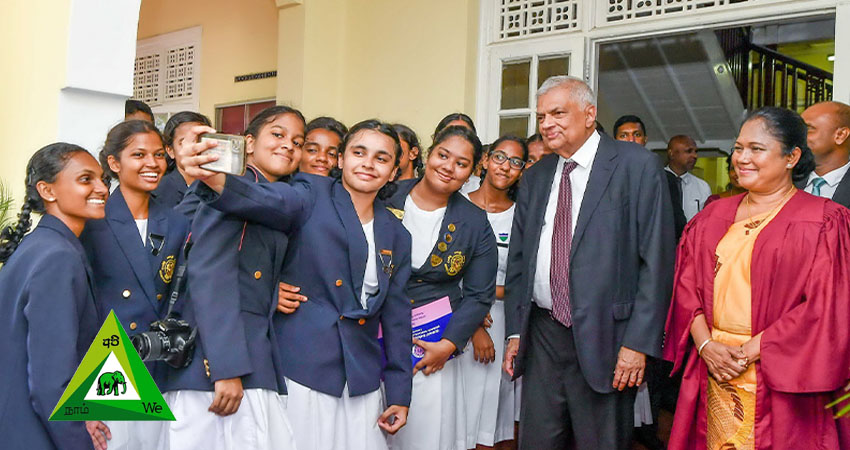Harnessing Modern Technology and Knowledge as Cornerstones of Educational Advancement

- Envisioning a Transition to a Knowledge-Based Society Over the Next 75 Years- Says President Ranil Wickremesinghe attending the 2022 annual prize giving ceremony of Sirimavo Bandaranaike Vidyalaya, Colombo.
President Ranil Wickremesinghe emphasized that the renewal of knowledge stands as a pivotal task within the realm of education, underscoring the trajectory towards a knowledge-based society for the nation’s advancement over the next 75 years. Acknowledging the burgeoning role of modern technology and knowledge as the new pillars of education, he warned that irrespective of economic prowess, failure to synchronize with global transformations would impede progress.
These sentiments were voiced during his participation in the 2022 annual prize-giving ceremony at Sirimavo Bandaranaike Vidyalaya, Colombo, earlier (05). The President’s arrival at the Vidyalaya was met with enthusiastic reception from students, as the Senior Western Band, Senior Eastern Band, and Dance Team escorted him to the event.
During the ceremony, President Wickremesinghe awarded prizes to female students who excelled across all subjects in the 2022 A-Level examination, alongside commendations for the teachers who facilitated their success and those who demonstrated exemplary attendance. Additionally, he bestowed challenge trophies upon four outstanding female students, with the prestigious Dr. Sumedha Jayaweera Challenge Trophy for the most exceptional student of 2022 awarded to Imasha Wimalaratne.
Principal Dr. Sumedha Jayaweera extended a commemorative gift to the President, who reciprocated by leaving a note in the school’s special guest book before departing.
Expressing his views at this event, President Ranil Wickremesinghe said;
I am delighted to have had the opportunity to contribute to the advancement of Sirimavo Bandaranaike Vidyalaya during my tenure as the Minister of Education. The tangible outcomes of our efforts are evident today. Amidst personal challenges, I resided close to this institution. Over the past two years, we have systematically propelled the country forward, safeguarding it from regression. However, our work is far from complete. We must sustain this momentum for another 5 to 10 years.
Furthermore, we must prioritize the future of our nation’s children. As you all prepare to integrate into an evolving society, it is the government’s duty to equip you for the journey ahead. Today’s youth are fortunate to have access to modern tools such as mobile phones and laptops, which serve as potent educational assets.
Our nation’s development is paramount. Over the next 10-15 years, we must foster a robust economy in collaboration with the global community. This necessitates comprehensive modernization across all sectors, underpinned by knowledge and technology. Concepts like Smart Agriculture and blockchain technology underscore the importance of acquiring relevant expertise.
In the contemporary landscape, there exists a significant power struggle between governments and online entities. Traditional methods of control are rendered ineffective by the advent of online platforms. Consequently, new legislative measures are imperative to address issues like online misconduct.
In this rapidly evolving world, continuous learning is essential for progress. Without embracing new knowledge, advancement becomes unattainable. Thus, the primary objective of education must be the continual renewal of knowledge.
To this end, the government is committed to revamping the education system. Plans are underway to establish education boards in every province, ensuring equitable access to resources. Moreover, both teachers and students must receive training in English language proficiency and information technology, alongside the provision of necessary equipment.
Presently, the global landscape is poised to embrace the transformative potential of Artificial Intelligence (AI) technology. It is imperative that we equip ourselves with this knowledge to remain at the forefront of technological advancement. As such, we have devised plans to integrate AI technology into the school curriculum. This strategic move not only ensures our competitiveness but also positions us to surpass India in AI development, for which new legislative frameworks are being formulated.
Moreover, our vision encompasses the establishment of the Green University as a fully-fledged institution, thereby enriching our country’s educational landscape. Additionally, during my official visit to India, Prime Minister Narendra Modi pledged to provide a campus of Chennai IIT to our nation. Furthermore, funds have been allocated to establish three technical universities in Kurunegala, Seethawaka, and another area, facilitating the dissemination of technical expertise to our youth.
Furthermore, the transformation of the SLIIT campus into a university underscores the imperative to revamp our university system. This restructuring is essential to cultivate the skilled workforce needed to drive progress. Plans are also underway to initiate new engineering faculties across all universities, alongside the establishment of faculties of physics and medicine. Recognizing the exodus of doctors from the country, efforts are underway to expand medical faculties to accommodate more students and address this shortage.
The trajectory of our nation’s progress over the next 75 years hinges on the revitalization of our education system. Without this fundamental transformation, economic growth alone will prove insufficient to propel us forward in the global arena.”
Notable figures including Education Minister Dr. Susil Premajayantha, National School Director Hashini Talagala, Colombo Regional Education Director P. R. Devabandhu, Deputy Principals Anupa Piyathilaka and Venuka Galappatti, Founding Principal of Sirimavo Bandaranaike Vidyalaya Wimala Liyanage, former Principals R.M. A. Jayasekara and Nanda de Silva, alongside a group of teachers and alumni, were present to mark this significant occasion.














